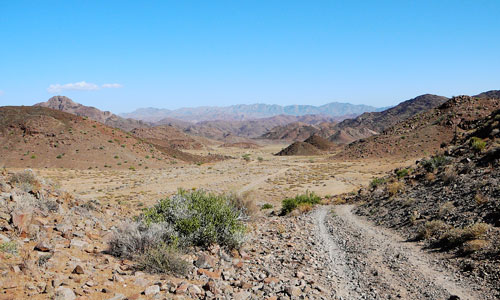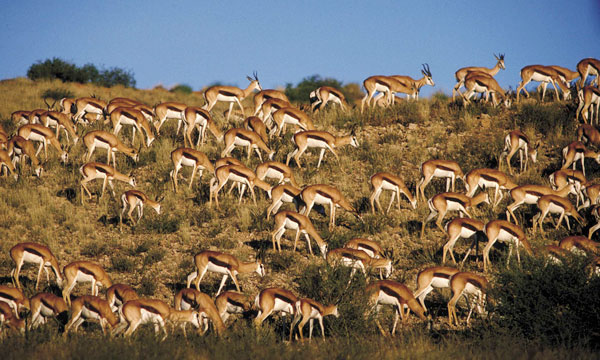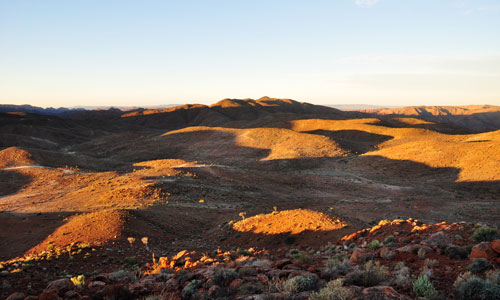Ethics
AFRO FOODZ is dedicated to Sustainability, Animal Respect and Transparency.
Sustainability
It is paramount to us that our activities create an enduring capacity for environment and people. We strive for environmental sustainability by minimising ecological footprint and assuring that nature is conserved and biodiversity maintained. By developing farmers and communities we provide them access to market for their products so that they can earn a sustainable income.

Ecological Footprint
The environment is not negatively impacted by the consumption of our Springbok meat. Red meat has a decadent image because, compared to a cereal crop, it makes a much larger ecological footprint to produce the same amount of nutrition. However, this argument only holds in regions with high rainfall and where the alternative exists to plant cereals, or in the case where cereal is used as feed in "factory farm" meat production.
The Karoo is a semi-desert where crops cannot grow. Contrary to crops, antelope do not require a continuous supply of rain to survive. Evolution has perfected their adaptability so that their body functions like a battery that stores energy from food and water when it is available and consumes the stored energy in times of need. So the only way to produce food from this dry Karoo area is by "harvesting" the excess of animals that can naturally survive there. The Koi and San people, the original inhabitants of sub-Saharan Africa before the West-African and European tribes arrived, would not have survived here without hunting antelope.
Nature that creates the Springbok has zero ecological footprint and is sustainable on condition that the animals to be culled are carefully selected and the number of "harvested" animals controlled.
But what about the footprint of the sea transport to bring the food to Europe? The total amount of energy resources required and toxins released to make the Springbok available to you is less than the "factory farmed" meat available in the supermarket. The apparently big transport effort to bring the meat from sub-Saharan Africa to your plate in Europe is dwarfed by the huge energy consumption of maize and soya feed, which in most cases is also imported from equally distant developing countries.
Springbok is the ethical red meat alternative with a small ecological footprint.

Nature Conservation
Africa has 72 species of different antelope, one of which is the Springbok antelope. Springbok is the most common antelope in the vast and dry Karoo and Kalahari areas. They roam in natural abundance in their habitat and with ever increasing numbers. The International Union for Conservation of Nature (IUCN) has Springbok listed as lowest risk and with status "LC", which stands for Least Concern.
The dynamics and numbers of the Springbok herds are closely monitored. "Harvesting" of antelope is only authorised if it is established that the carrying capacity of the environment cannot sustain the growth in numbers of antelope. Excess animals are carefully selected to ensure that removing them would have the least social impact on the group. In order to sustain the income of the community or the farmer, it is vital that the Springbok herd remains stable and healthy and can sustain itself indefinitely.
Biodiversity
In sub-Saharan Africa biodiversity is challenged by monoculture farming. Few species, most of them not indigenous, are planted and bred while the original species are marginalised or even removed. Antelope which used to occur naturally in the whole area were marginalised by the introduction of livestock, especially sheep. It is a fact that farmers and communities plant and breed what the market demands. If they know that Springbok can earn money for them in the same way that livestock can, they will be willing to repatriate Springbok antelope back to their land. Expanding this idea to other indigenous species will allow the biodiversity to be sustained.

Animal Respect
If we eat meat, animals have to die. That is a fact. But humans are not the only carnivores running on this beautiful planet Earth. In the past, lions used to eat the same antelope that we offer you now. But since lions also eat humans, they have been restricted to the large game reserves. This leaves the antelope with no real natural enemy and their population will explode if you do not eat them instead of the lion. This is not to be taken as a joke.
How organic is organic meat? How many square meters are required to give a pig, chicken or cow a happy, respectful life? What slaughtering process is acceptable? These are difficult questions to answer.
Our Springbok antelope are born and run free in the vast Karoo semi-desert in South Africa. They live on large tracts of land that range between 50 to 300 square kilometres and humans do not interfere with them during their life. After living a stress-free life in the open desert plains, greatest care and skill is taken by professionals to expertly cull selected animals during the night. They are sleeping during the night and do not expect this. They are culled in their natural habitat with a rifle and silencer and shot in the head, killing them immediately. There is no anticipation, anxiety or stress, there is no pain. Unlike most animals that we consume today, there is no cruel mass collection in their last moments of life and no squashed live transport to the abattoir.
If we eat meat, an antelope has to die. But at least it had a normal, peaceful, and respectful life out there in its natural habitat.
Transparency
Any attempt at sustainability requires transparency. Transparency exposes the activities, the products and the people behind the products. It empowers the customer to judge the ethics of an organisation and its products.
AFRO FOODZ has short, simple and clear supply chains. We aim to connect the customer with the community or the farmer that grows the plants or looks after the animals. In order to achieve this we let the farmer or community tell their story and capture this on film. Instead of us telling you their story, we show you the film and allow them to tell you their story directly. We hold mobile cooking workshops where you can learn how to best prepare the ingredients and get a chance to taste them, as well as see the films with the story behind the product and the community or the farmer.
In a world of too many anonymous brands where we are resorted to judge them by their packaging, which is expensive and direct waste, we make food personal and transparent again.